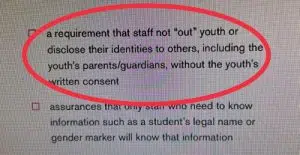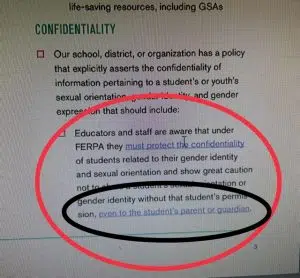District 87 educators, including elementary (PreK-12) educators, were sent an email from the Bloomington Education Association that reminded them that they are required to not “out” students’ gender identities to others, including parents.
 The email said, “Our school, district or organization has a policy that explicitly asserts the confidentiality of information pertaining to a student’s or youth’s sexual orientation, gender identity or gender expression….Educators and staff are aware that under FERPA they must protect the confidentiality of students related gender identity and sexual orientation and show great caution not to share students gender identity and sexual orientation without student’s permission, even to the student’s parent or guardian.”
The email said, “Our school, district or organization has a policy that explicitly asserts the confidentiality of information pertaining to a student’s or youth’s sexual orientation, gender identity or gender expression….Educators and staff are aware that under FERPA they must protect the confidentiality of students related gender identity and sexual orientation and show great caution not to share students gender identity and sexual orientation without student’s permission, even to the student’s parent or guardian.”
 The email went on to say written consent from the student or youth is a requirement before disclosing identities or sexual preference to a parent.
The email went on to say written consent from the student or youth is a requirement before disclosing identities or sexual preference to a parent.
Perhaps some teachers try to get students to answer “written surveys.” A district 87 high school student disclosed to this writer that she was asked to participate in a survey by a D87 teacher where there questions like: What are your preferred pronouns? Can I share your pronouns with your parent/guardian?
Recently, in Colorado the teacher’s union (Jefferson County Education Association) told teachers “if you do a questionnaire, please make it a paper and pencil activity – any digital records are more permanent and may be requested under federal law.”
The Colorado union sent them an email and told teachers to do paper and pencil surveys after the school district said it’s unclear whether surveys about students’ preferred pronouns are illegal, there are several lawsuits regarding the issue. So, administrators told teachers – just don’t go there.
This is a “checklist item” from the new “resources” for teachers provided by the Human Rights Campaign, who has partnered with the National Education Association, to start off the new school year.
This comes after news of a lawsuit that alleges that a Virginia high school student ran away from home and was subsequently sex-trafficked across multiple states, as a result of the school’s failure to notify her parents of the fact that she socially transitioned to male and withheld. The lawsuit alleges that the school district withheld information about Sage, who attended Appomattox County High School at 14, being bullied because of her gender identity in fear of disclosing her “gender identity.”
The school pursued a social transition for Sage behind the back of her parents, the lawsuit filed by the Child & Parent Rights Campaign alleges.
Michele Blair, mother of Sage, filed a lawsuit against the Appomattox County Board of Education and district staff, as well as Baltimore area public defender Aneesa Khan, who is accused in the lawsuit of conducting a “series of acts aimed at depriving Mrs. Blair custody of her daughter and keeping [Sage] in Maryland to be affirmed in a male identity.”
The school withheld information despite there being no evidence of the parents being child abusers.
“They stole my right to protect my daughter,” Blair told the Washington Examiner. “I’m the parent, I am an expert on my child, there is nobody in the school or court system that knows my daughter better than me. They will never know my daughter better than I do.”
The child, Sage, suffered “a psychotic breakdown,” ran away, and into the “arms of a waiting pedophile” where she was raped, drugged and trafficked for months.
Several states have banned so-called “gender affirming care” for minors, including Missouri. The governor of Illinois, JB Pritzker, called that ban “despicable.”
Gov. J.B. Pritzker calls Missouri’s ban on gender affirming care for trans teens “despicable.”
“They deserve to live in a place that’s welcoming, that’s affirming, that supports them. And we provide that kind of care in Illinois. And we support people who do provide that care.” pic.twitter.com/WEmn55xmZd
— Mark Maxwell (@MarkMaxwellTV) September 7, 2023
“It is very important for parents and children to be able to communicate openly and effectively with each other. When communication is done effectively, children begin to feel that they are respected, heard and understood by their parents, which is a boost to their self-esteem,” says the website of Voices of Youth, which is an organization set up by UNICEF to help children from across the world exchange knowledge and ideas.
Note: This story was edited by WRPW Operations Manager Chris Murphy





